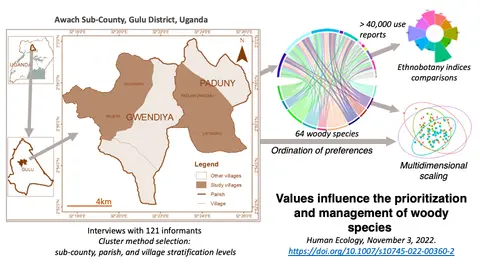Values influence the prioritization and management of woody species
December 02, 2022.
Woody plants support the livelihoods and well-being of communities around the world. However, the establishment, management, and use of essential woody species can vary across regions. A recently published paper in Human Ecology titled ‘Priority Species and Management Approaches for Woody Species: A Case Study of Awach Sub-county, Gulu District, Uganda’ by colleagues at Makerere University, Gulu University, and the University of Bonn describes the diversity and use of woody species and explores the values for which people maintain and protect these plants.
Through household interviews and exploratory quantitative ethnobotany they reveal 64 multipurpose tree species. The results indicate that respondents actively manage species with material contributions such as household commodities and income generation. However, non-material and regulatory services were often not considered. Locally this lack of recognition is contributing to insufficient active management, unintended losses and negative repercussions for biodiversity. There are also many challenges for tree management, such as pests, diseases and lack of infrastructure. The findings offer insights into potential policy mechanisms targeting the establishment of trees in the region and other parts of Uganda and sub-Saharan Africa.
Overview of Tabuti et al. 2022. Map of the study region in Awach sub-county in Aswa County of Gulu District, Uganda where the authors interviewed informants; Chord diagram of the ethnobotanical uses for the top 10 culturally important species; Comparative quantitative ethnobotany indices for 64 woody plants; Ordination plot of preferences for the species, based on socio-demographic characteristics of the informants
Reference
Tabuti, John Robert Stephen, Esther Patricia Adoch, Christopher Mawa, and Cory Whitney. “Priority Species and Management Approaches for Woody Species: A Case Study of Awach Sub-County, Gulu District, Uganda.” Human Ecology, November 3, 2022. https://doi.org/10.1007/s10745-022-00360-2.


